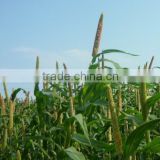Export High Yield Hybrid Penisetum Forage Seed
USD $60 - $65 /Ton
Min.Order:1 Ton
Quick Details View All >
Beihai Green Kingdom Biology And Landscape-Creating Co., Ltd.
Product Details
Subtropical Region Hybrid Pennisetum Grass Energy Plant Seed
1.high yield
2.high contents of lignin and cellulose of their biomass
3.carbon content is very high
4.perennial grass
Perennial grasses as energy plants
Green plant catches about 0.024% solar energy,it is light energy converter. Green plants through photosynthesis,
converting solar energy into chemical energy in plants, namely the plant biomass, it is considered to be only second to
coal, oil, natural gas as the fourth energy.
Plant energy has many advantages:
First, it can regenerate,It can achieve sustained and stable supply as long as the proper management;
Second,it is widely distributed, the plants on earth energy distribution scope than fossil energy distribution range;
Third, contrast to the mineral sources,there is no pollution.
The fourth, it is to make full use of land, there are many plant energy production base as barren ground, abandoned
farmland and undeveloped land,.
Plant energy has many advantages:
It can regenerate, as long as the proper management can achieve
sustained and stable supply; two is widely distributed, the plants on earth energy distribution scope than
fossil energy distribution range; three there is no pollution, which is associated with the mineral the sources
of energy in contrast; the four is to make full use of land, barren ground, abandoned farmland and
undeveloped land, these are the plant energy production base.
Characters of perennial grass
Perennial grasses as an energy plant is characterized in that they have high growth yield and its raw mater
ial, the cell wall is rich in lignin, cellulose and hemicellulose, this is as essential to the basic conditions of
energy plant. Especially when they are used as Solid biofuels is even more so.
There are two main reasons: first, they have high calorific value, the lignin in the carbon content is very high ( 64%);
second, strongly lignified plants in low moisture conditions can still maintain an upright. Therefore, the biomass of
perennial grasses with low moisture content, even in the stalk harvest can not dry, but delayed harvest
also can improve the biomass quality. In addition, the biomass of perennial grasses, lignin and cellulose
content was higher than annual plants.
Production and utilization of perennial grasses and many ecological benefits.
First of all, using its biomass instead of fossil fuel can reduce the CO2 emission; secondly, compared with
other biomass resources, such as woody plants and C3, C4 grasses can provide more than 2 times the
annual biomass yield, because they have more effective photosynthetic pathway and stronger CO2 fixation
capacity. Compared with annual plants, perennial grasses on soil tillage farming need only in those days,
do not need long term on the soil tillage system also reduces the risk of soil erosion, increase soil carbon
content. But, because of nutrients through the root system of circulation, thus perennial grasses on
nutrient input requirements of very low . Because of their natural pest less, and thus requires few or
the need for pesticides. In this case, it is possible to reduce the interference of the soil, coupled with
the late winter or early spring on grass harvest, and without the use of pesticides, can lead to different
species of perennial grasses in the group, especially birds, mammals and insects in number and activity
capacity increased .
Contact Supplier

You May Like
New Products
Popular Searches
Recommended Products
Find Similar Products By Category